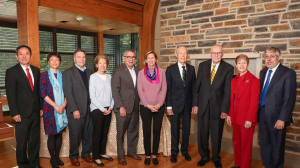Pathology Current and Former Faculty Members Give Back
Like a lot of alumni, David N. Howell, AB’76, MD’84, PhD’82, HS’84-’85, ’86-’87, learned from a number of influential mentors when he was a student and trainee at Duke. Unlike most, he married his mentor.
Sara E. Miller, PhD, was a young faculty member doing pioneering work in electron microscopy when Howell took her course as a graduate student. That class helped define his path both personally and professionally; some years later he and Miller were wed, and electron microscopy has been an essential tool throughout his career as a pathologist.
Both Howell and Miller are professors of pathology at Duke. Recently they made a substantial gift to create The Rollie Assistant/Associate Professorship of Correlative Pathology.
“We’ve been very supported by the university, and we wanted to give something back,” says Howell. “Teaching is important to both of us, and of course we met in the context of her being a teacher. We want to foster teaching as well as research. We’re excited about the prospect of helping nurture a young faculty member’s career.”
Deep Ties to Duke
Whenever Fred Sanfilippo, PhD’75, MD’76, HS’76-’79, and his wife Janet, WC’72, MBA’80, talk about philanthropy, the question isn’t whether to give back to Duke, but what part of Duke to give back to.
Their ties to the university run both deep and wide. Fred earned two degrees, did his residency in pathology, and then joined the faculty as a professor of pathology, surgery, and immunology. Janet received undergraduate and graduate degrees and then worked for many years in the President’s Office, the School of Medicine, and the Fuqua School. Longtime Davison Club and Founders Society members, the Sanfilippos have given generously to Duke in numerous ways over the years. They made an estate gift to support the Medical Scientists Training Program in the School of Medicine, but they wanted to give even more.
“It could have been the Departments of Immunology or Pathology or the Fuqua School, where we learned so much,” says Sanfilippo. “Or the Cancer Center, which saved Janet’s life, or Neonatology, which nursed our daughter through her difficult first hours.”
In the end, they designated the Duke University Department of Pathology as an additional recipient of their bequest commitment. Their endowment will support The Fred and Janet Sanfilippo Professorship Fund in the Department of Pathology.
“The Duke Department of Pathology truly shaped my career, especially in providing incredible mentors and leaders such as Tom Kinney and Bob Jennings, as well as a host of outstanding colleagues. This gift is a way of saying thanks and helping the department continue to influence the careers of others,” says Fred.
Lives of Service
William W. Johnston, MD’59, and Charles R. West have a more than half a century of combined service to Duke University. Johnston joined the Department of Pathology after completing medical school and residency at Duke. At the time, the department was small and had limited resources. “Unlike surgery or medicine, pathology is a department without grateful patients,” says Johnston. “Yet it is vital. All of medicine is buttressed by pathology.”
Over the course of a distinguished career, Johnston worked tirelessly to improve the department’s diagnostic, teaching, and research capacities. Among other things, he lobbied to create the Division of Cytology and then became the first director of the division, a position he held for 25 years. Johnston established the first formal training for residents in cytology in the United States.
West spent 27 years as director of corporate payroll services at Duke, instilling in his team an ethos of pride and service. Upon his retirement, he received the Duke University Award for Merit for his exemplary service.
But even in retirement Johnston and West continue to serve. Recently, they established a generous estate gift that will endow a professorship and multiple fellowships in the Duke University Department of Pathology. Their estate gift will continue the legacy to which Johnston devoted his career: training future generations of pathologists.



